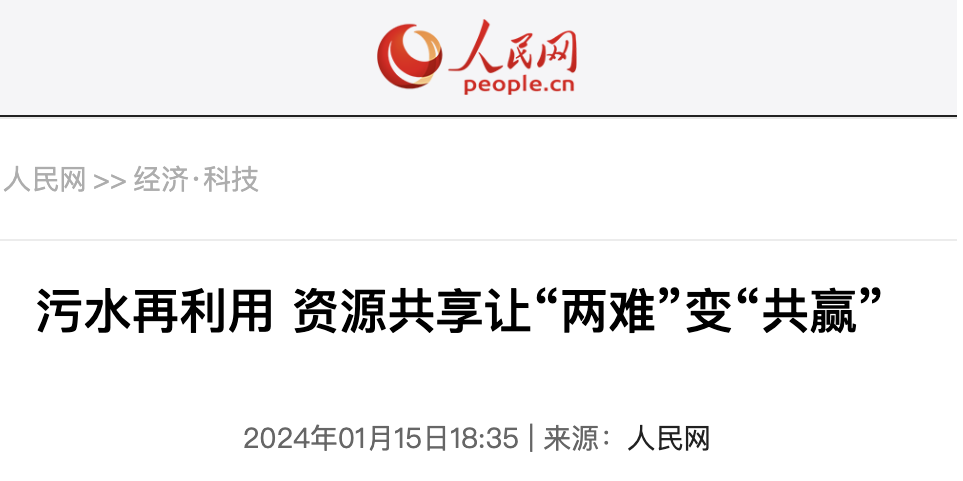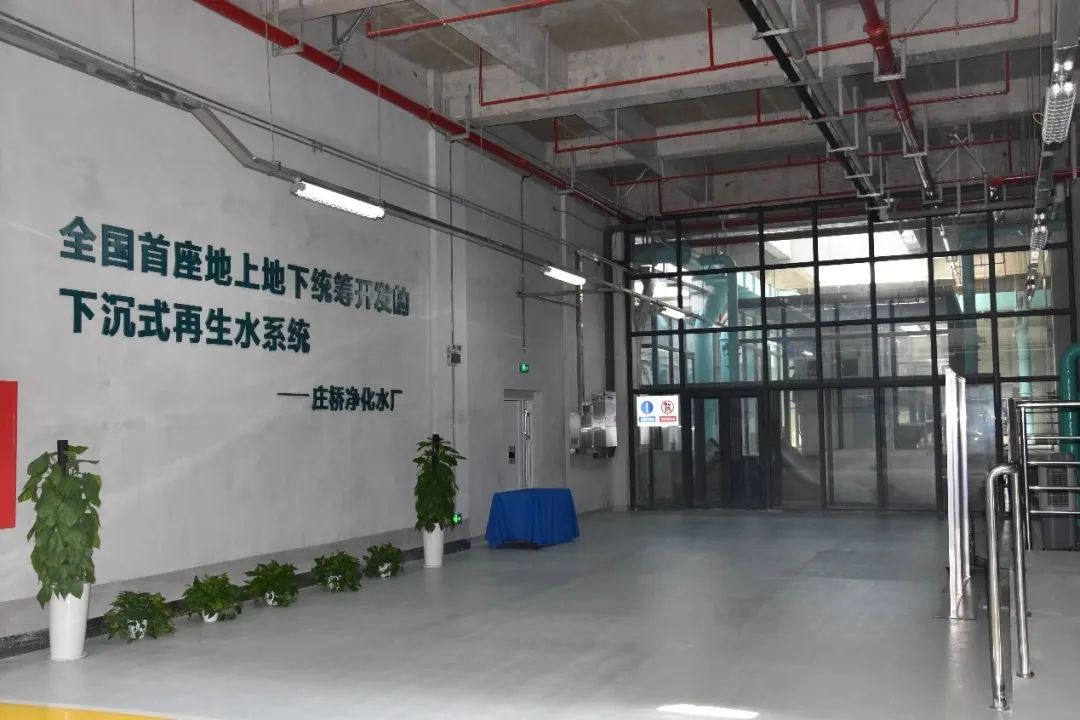People''s Daily Online | Sharing Reused Sewage Resources in Ningbo Turns "Dilemma" into "Win-Win"
2024-01-17
 At the construction site north of Ningbo North Freight Station in Jiangbei District, Ningbo City, Zhejiang Province, workers are busy, and construction vehicles shuttle back and forth; underground, a continuous flow of sewage enters the water reclamation plant, where it is processed and turned into a valuable resource, becoming the city's urban environmental water...
At the construction site north of Ningbo North Freight Station in Jiangbei District, Ningbo City, Zhejiang Province, workers are busy, and construction vehicles shuttle back and forth; underground, a continuous flow of sewage enters the water reclamation plant, where it is processed and turned into a valuable resource, becoming the city's urban environmental water...


In June 2023, an underground water reclamation plant in Jiangbei District, Ningbo, officially started operation. It addresses local ecological management issues underground while fostering the development of a new emerging intelligent manufacturing industrial park above ground, providing a new solution for urban renewal and sustainable development.
It is reported that Jiangbei District, as a densely populated old urban area, had been plagued by the lack of effective sewage treatment facilities, with sewage overflow being a major ecological concern in this area. To address this issue comprehensively, the Ningbo Municipal People's Government thoroughly studied and selected domestic underground water reclamation plant solutions. Through public bidding, the China Water Environment Group was ultimately chosen to construct the underground water reclamation plant in Jiangbei District. This plant has a processing capacity of 150,000 tons per day and is responsible for treating sewage from a surrounding population of 300,000. It achieves integrated development of above and below-ground spaces by placing sewage treatment equipment underground, turning "not in my backyard" into "yes in my backyard" for the neighborhood.
"Jiangbei District not only lacks centralized sewage treatment facilities but also faces a shortage of industrial land. In this context, the government ultimately decided on the development plan of constructing a water reclamation plant underground and an industrial park aboveground, achieving comprehensive development both above and below ground, with equal emphasis on livelihood and industry."A spokesperson from the Ningbo Water Resources Bureau said in an interview that this integrated development model, with facilities both above and below ground, is rare in China. Therefore, government departments have been gradually solving various issues related to land supply and planning.
As Jiangbei District ranks among the top 100 districts in terms of comprehensive strength and green development in the country, its development momentum is strong. However, the district faces a scarcity of newly added industrial land. Developing the industrial park above ground could release the development potential of 122 mu of urban land.
During the project planning phase, the "one case, one discussion" principle was adopted, with the government leading coordination among various departments to overcome difficulties in land approval. At the same time, control and planning adjustments were made to achieve vertical layering of land use. This exploration led to the innovative model of "one area, two certificates, and coordinated planning". Underground areas are designated for public and environmental facilities, allocated to water plant enterprises free of charge by the government, while aboveground areas are designated as industrial land and transferred through a "bid-auction-listing" process. This model generated nearly 160 million yuan in government revenue and attracted investments worth 635 million yuan. Upon completion of the industrial park, it is expected to create 2,000 job opportunities and generate an additional annual tax revenue of 40 million yuan.
Huang Jian, a senior engineer at the Ningbo Water Environment Group project, said, "The 'one area, two uses' model in the construction of underground water reclamation plant projects is a national precedent. This innovative model has borne fruit in Ningbo under the strong support of various relevant government departments. "
The exploration of the new model benefits primarily the surrounding residents and urban governance.A spokesperson from the Ningbo Water Resources Bureau stated that, on one hand, they are maximizing resource reuse. They have implemented the "reclaimed water resource recycling" project, focusing on four reuse directions: ecological water supplementation for rivers, landscape greening irrigation water, high-quality industrial direct water supply, and municipal miscellaneous water use. By networking and supplying reclaimed water through "reclaimed water pipelines + industrial water supply pipelines + urban river networks," they promoted the recycling and utilization of reclaimed water, turning waste into treasure, and have cumulatively supplemented over 15 million tons of water for the ecological water supplementation of major rivers such as Jiangbei River.
On the other hand, they are promoting integrated energy conservation and emission reduction.They are fully utilizing the characteristics of the warm winter and cool summer temperatures of underground water plants, focusing on developing green and energy-saving water source heat pump systems. By utilizing the heat pump principle to raise the temperature using air or water as a secondary refrigerant and then transporting it to buildings, it can provide heating and cooling for around 200,000 square meters of surrounding aboveground buildings. Compared to traditional air conditioning systems, it saves about 50% of electricity consumption and reduces carbon emissions by around 4,500 tons per year.


As one of the nearby employed individuals, Su Honghong, a villager from Su Feng Village in Zhuangqiao Street, Jiangbei District, Ningbo, has been working at the Zhuangqiao Purification Plant for over half a year."It's really just like what the street and village committees said at the beginning, there's no noise or strange smells. The operation of the water plant not only cleans up the river but also provides me with a job right at my doorstep," Su Honghong said.
The aboveground and underground integrated development model of the underground water reclamation plant in Jiangbei District has not only solved the problem of unbalanced sewage treatment in various regions of Ningbo but has also achieved significant economic and social benefits, emphasizing both people's livelihoods and industries.
"The underground water reclamation system developed through the integrated development of above and below-ground spaces has created the new model for water environment green and low-carbon industrial development, transforming traditional treatment and discharge into efficient utilization of water resources, land resources, and green energy. This model has excellent reference and promotional significance for areas with scarce resources and high land values," said Chen Jianping, project manager of the Ningbo Water Environment Group.
In fact, underground water plants are not a new concept. In May 2022, the General Office of the State Council issued the Opinions on Further Revitalizing Existing Assets to Expand Effective Investment(hereinafter referred to as the Opinions). The Opinionsproposed actively exploring models such as underground sewage treatment plants, property development above subway stations, comprehensive development of above and below-ground spaces at transportation hubs, and the development of operational public service spaces in affordable rental housing communities to effectively revitalize existing railway stations and surrounding exploitable land assets, and enhance project profitability. Recently, the National Development and Reform Commission, the Ministry of Housing and Urban-Rural Development, and the Ministry of Ecology and Environment jointly issued the Implementation Opinions on Promoting Synergistic Efficiency Enhancement of Sewage Treatment, Pollution Reduction, and Carbon Reduction, which clearly stated that "cities with scarce land resources can build fully underground/half-underground sewage treatment plants and encourage the reasonable use of aboveground space by building parks and green activity areas".
China's basic water situation involves a large population, limited water resources, and uneven spatial and temporal distribution of water resources, which do not match with economic factors.Data shows that although China has a large total water resource volume, the per capita water resources are only one-fourth of the world average, making it one of the 13 countries with the most scarce per capita water resources globally.
Wang Hongchen, Deputy Dean of the School of Environment & Natural Resources at Renmin University of China, stated in an interview with reporters that looking at international experience in addressing water scarcity issues, unconventional water resource development and utilization such as sewage recycling, is the fundamental approach. Different regions can utilize underground sewage treatment plants to intensively use land, reduce carbon footprints, and continue exploring development potential based on local conditions.
"Nowadays, the ecological benefits of water reclamation plants have become apparent, and the industrial park under construction above ground will welcome relevant resident enterprises after its completion by the end of June 2024," said Chu Wuyue, the project manager of China Water Environment Group. Against the backdrop of the release of related policy dividends and institutional exploration, the integrated development of above and below-ground water reclamation plants has received high attention and full support from local government departments. This not only will serve more residents but also become a "cradle" for enterprise growth.
 中国水环境集团
中国水环境集团









